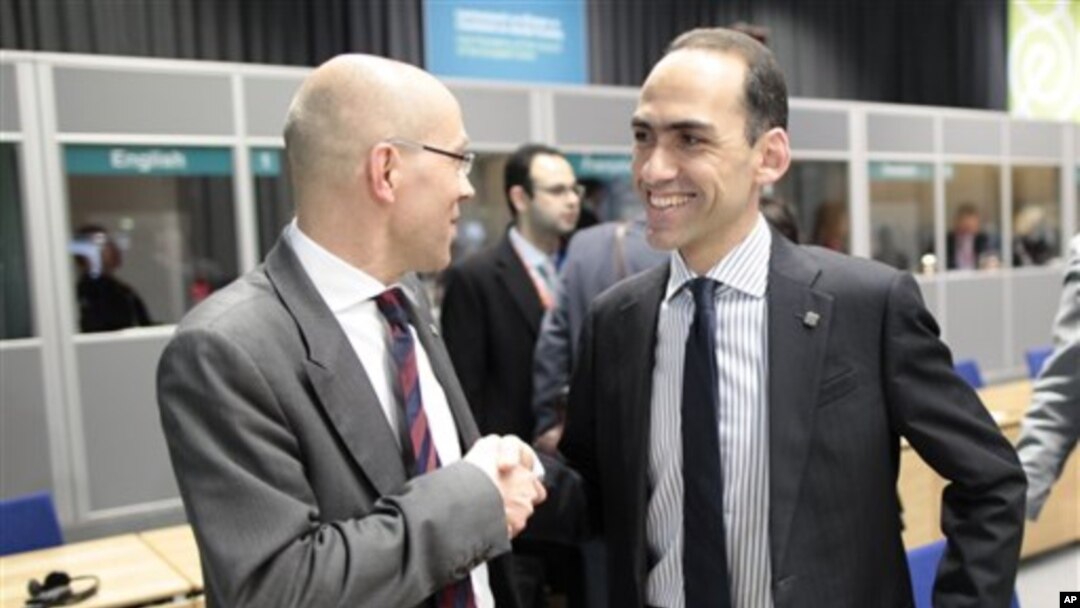LONDON —
Eurozone finance ministers on Friday formally approved the terms of a problematic Cyprus debt rescue. The bailout for Cyprus marks an important shift in the eurozone crisis, with bank depositors paying out to help fund the rescue.
The rescue deal is worth $13 billion. Under the deal's terms, Cyprus will be responsible for raising the remaining billions in the rescue package.
This week, questions were raised over just how many billions that will be.
Initially the overall package was gauged at around $22 billion. But documents leaked to the media this week showed the overall price tag could be as high as $30 billion.
On Friday, eurozone ministers meeting in Dublin formally approved the rescue deal, without raising their own contribution to the package.
The deal is now ready for approval by member states and the first tranche of the loan - cash badly needed in Cyprus - could be ready by the middle of next month.
International lenders have estimated that the economy of Cyprus will contract by nine percent this year and almost four percent the year after.
Olli Rehn, the EU monetary affairs commissioner, said Friday the economy could shrink by as much as 15 percent this year alone.
"We are revising the growth forecast and of course there is plenty of uncertainty about the exact trajectory of economic growth in Cyprus," he said.
He said EU structural funds aimed at boosting euro economies may be brought forward to help Cyprus.
Cyprus is implementing spending cuts and banking sector reform to try to raise the funds it needs. The banking sector in Cyprus is about eight times the size of the economy.
Bank depositors have been forced to make their own contribution to the bailout, with a tax on accounts containing more than $130,000.
Portugal and Ireland were also on the agenda at the two-day meeting in Dublin.
Ireland received a bailout in 2010 and the following year Portugal received its own bailout worth just over $100 billion.
On Friday, the ministers agreed to extend the bailout loans by seven years.
Jeroen Dijsselbloem, the Dutch finance minister and Eurogroup president, spoke at a press conference early in the day.
"The ministers of the eurogroup would like to take a definite and positive decision on this extension of the maturities of the loans for seven years, pending the decision of the ECOFIN colleagues this afternoon," he said.
The eurozone is to contribute just under $12 billion to the Cyprus bailout. Just over $1 billion will come from the International Monetary Fund.
The rescue deal is worth $13 billion. Under the deal's terms, Cyprus will be responsible for raising the remaining billions in the rescue package.
This week, questions were raised over just how many billions that will be.
Initially the overall package was gauged at around $22 billion. But documents leaked to the media this week showed the overall price tag could be as high as $30 billion.
On Friday, eurozone ministers meeting in Dublin formally approved the rescue deal, without raising their own contribution to the package.
The deal is now ready for approval by member states and the first tranche of the loan - cash badly needed in Cyprus - could be ready by the middle of next month.
International lenders have estimated that the economy of Cyprus will contract by nine percent this year and almost four percent the year after.
Olli Rehn, the EU monetary affairs commissioner, said Friday the economy could shrink by as much as 15 percent this year alone.
"We are revising the growth forecast and of course there is plenty of uncertainty about the exact trajectory of economic growth in Cyprus," he said.
He said EU structural funds aimed at boosting euro economies may be brought forward to help Cyprus.
Cyprus is implementing spending cuts and banking sector reform to try to raise the funds it needs. The banking sector in Cyprus is about eight times the size of the economy.
Bank depositors have been forced to make their own contribution to the bailout, with a tax on accounts containing more than $130,000.
Portugal and Ireland were also on the agenda at the two-day meeting in Dublin.
Ireland received a bailout in 2010 and the following year Portugal received its own bailout worth just over $100 billion.
On Friday, the ministers agreed to extend the bailout loans by seven years.
Jeroen Dijsselbloem, the Dutch finance minister and Eurogroup president, spoke at a press conference early in the day.
"The ministers of the eurogroup would like to take a definite and positive decision on this extension of the maturities of the loans for seven years, pending the decision of the ECOFIN colleagues this afternoon," he said.
The eurozone is to contribute just under $12 billion to the Cyprus bailout. Just over $1 billion will come from the International Monetary Fund.


